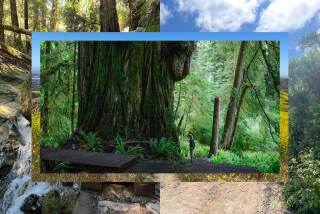Coming Soon: Red-Tape Repair to Secure Parks
Most of us in Orange County know that we are blessed with a vast amount of regional park and open space, and we have assumed it will be there for future generations to enjoy. It turns out that our parklands could be traded or sold off by a three-fifths vote of the Board of Supervisors. This is simply because the proper deed restrictions were not placed on titles when the land was transferred to the ownership of the county.
During research on the deeds to Santiago Oaks Regional Park during the âSave Barham Ranchâ effort last year, it was discovered that the county had no uniform policy governing the acceptance of title to parks and open space land. As a result, over half of these facilities are without appropriate language on the deeds that would prohibit a Board of Supervisors from trading or selling off these properties.
What this means in plain English is that parkland (which we all believed was permanently protected) could be abandoned by the county for any purpose--the most likely being to benefit a developer who needs adjoining land for such things as slope and road construction. As a matter of fact, there have been several such transactions in recent years, but they have been kept under the radar screen, for obvious reasons.
In December of 1999 this information was presented to the Harbors, Beaches and Parks Commission. It also had assumed that the parks were protected. Officials were completely unaware that significant portions of the countyâs park system lacked the proper protective deed restrictions on their titles.
They had assumed, as we all have, that the countyâs parks and beaches were permanent and not available for trading off by supervisors who were doing political favors for their lobbyist friends, who are hired by developers to âget things doneâ at the county.
The commission directed its staff to conduct an inventory of all the countyâs 27,000 acres of parks and beaches to identify which parklands were not properly deed-restricted. The results of this inventory revealed that about 33% of the countyâs acreage is without protection because it was either acquired or transferred to the county without the proper restrictive language in the title papers. Without that language, the land could be used for ânon-parkâ purposes without any forum in which the public could object to its abandonment.
Fortunately for those of us who want our county parks preserved in perpetuity, the state of California in 1959 enacted the County Park Abandonment Law. This law applies only to those properties that contain the restriction âfor park purposes only.â Properties without that language are not covered by the 1959 law.
That law lays out a restrictive procedure that must be followed by the Board of Supervisors if it wishes to trade or sell parkland. First, supervisors must adopt a resolution unanimously declaring their intent to abandon the property, and then schedule a public hearing no sooner than 60 days following the adoption of the resolution. This resolution is then published in local papers and at the park site. If a petition signed by at least 200 voters objecting to the abandonment is presented to the board prior to or at the public hearing, the board must either terminate the abandonment or submit it to a countywide vote at the next general election.
If the property deed is not restricted, this entire check and balance procedure is avoided. Some 9,000 acres of our parklands are therefore not subject to the 1959 abandonment law because they are not deed-restricted for park purposes only.
In order to bring these 9,000 acres under the jurisdiction of the 1959 County Park Abandonment Law, the Board of Supervisors will be asked late this month to impose deed restrictions on these properties. Under the auspices of the Harbors, Beaches and Parks Commission, the county staff has prepared maps and deeds for the first group of unrestricted wilderness/regional parks (Santiago Oaks, Aliso and Woods Canyon, Caspers and Irvine regional parks) for presentation to the board. Over the next six months, Featherly, Laguna Niguel, Limestone-Whiting, OâNeill, Riley and Weir Canyon parks also will be presented to the board.
The lack of appropriate deed restrictions on so many of our parks is a result of a different set of rules in county departments for taking title to property. Because the board did not have an established policy, each department operated to serve its own purposes. For example, the Real Estate Department wanted maximum flexibility for future options, hence, no deed restrictions. The Harbors, Beaches and Parks Department wanted permanent parkland, hence it imposed deed restrictions whenever it could.
The Board of Supervisors will be asked not only to impose deed restrictions retroactively on these parks but also to adopt a policy that requires all county departments to put deed restricts on future park acquisitions. With these actions, our existing and future parks will be off-limits forever to those who would trade or sell them for other uses.
More to Read
Sign up for Essential California
The most important California stories and recommendations in your inbox every morning.
You may occasionally receive promotional content from the Los Angeles Times.










